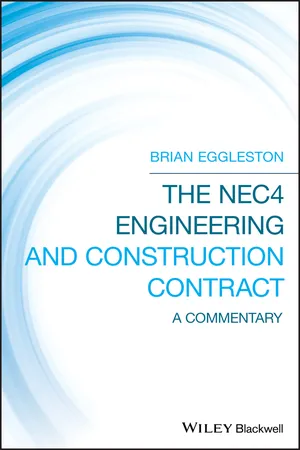
- English
- ePUB (mobile friendly)
- Available on iOS & Android
About this book
The authoritative guide to the NEC4 Engineering and Construction Contract
The New Engineering Contract (NEC) is one of the leading standard forms of contract for major construction and infrastructure projects. The latest edition of the contract (NEC4) is now a suite of contracts widely used in the UK, Australia, Hong Kong, South Africa, Ireland, and New Zealand. This timely and important book provides a detailed commentary on the latest edition of the main NEC4 Engineering and Construction Contract (NEC4 ECC) form. It explains how the contract is intended to operate and examines each clause to consider its application and legal interpretation. It also draws upon the author's highly successful third edition of the book covering the previous contract. It identifies and comments on the changes between the current and previous version of the form.
After a brief introduction to the new edition of the form, The NEC4 Engineering and Construction Contract offers in-depth chapters covering everything from main options and secondary option clauses to risk assurances and NEC 4 family contracts. In between, readers will learn about general core clauses, the obligations and responsibilities of the contractor, testing and defects, payments, compensation events, and much more.
- Covers the latest version of the NEC Engineering and Construction Contract, the leading standard form contract for major construction projects
- Examines the new contract clause by clause and compares it with the previous edition
- Previous editions were widely acknowledged as detailed and fair analyses of the NEC contracts
- Written by a highly regarded contracts commentator, experienced arbitrator, and adjudicator
The NEC4 Engineering and Construction Contract: A Commentary is an excellent book for construction industry professionals working for clients, employers, main contractors, project managers, subcontractors, and specialist contractors.
Tools to learn more effectively

Saving Books

Keyword Search

Annotating Text

Listen to it instead
Information
Chapter 1
Introduction
1.1 Overview
1.2 Background
1.3 Objectives
- that it should be more flexible in its scope than existing standard forms
- that it should provide greater stimulus to good project management than existing standard forms
- that it should be expressed more simply and clearly than existing forms.
- to provide even greater stimulus to good management
- to support new approaches to procurement which improve contract management
- to inspire increased use of NEC in new markets and sectors.
1.4 Impacts of change
I tell this tale, which is strictly true,Just by way of convincing youHow very little since things were madeThings have altered in the building trade.
Table of contents
- Cover
- Title Page
- Copyright
- Preface
- Author's note
- Chapter 1 Introduction
- Chapter 2 Changes from ECC3
- Chapter 3 Main options
- Chapter 4 Secondary options
- Chapter 5 Contract documents
- Chapter 6 Key players
- Chapter 7 General core clauses
- Chapter 8 Obligations and responsibilities of the Contractor
- Chapter 9 Time (and related matters)
- Chapter 10 Quality management
- Chapter 11 Payments
- Chapter 12 ECC4 compensation event schemes
- Chapter 13 Listed compensation events
- Chapter 14 Notifying compensation events
- Chapter 15 Quotations for compensation events
- Chapter 16 Assessment of compensation events
- Chapter 17 Title
- Chapter 18 Liabilities and insurance
- Chapter 19 Termination
- Chapter 20 Dispute avoidance and dispute resolution
- Chapter 21 NEC4 Engineering and Construction Subcontract
- Chapter 22 Legal decisions on NEC-based contracts
- Table of cases
- Table of clause references
- WILEY END USER LICENSE AGREEMENT
Frequently asked questions
- Essential is ideal for learners and professionals who enjoy exploring a wide range of subjects. Access the Essential Library with 800,000+ trusted titles and best-sellers across business, personal growth, and the humanities. Includes unlimited reading time and Standard Read Aloud voice.
- Complete: Perfect for advanced learners and researchers needing full, unrestricted access. Unlock 1.4M+ books across hundreds of subjects, including academic and specialized titles. The Complete Plan also includes advanced features like Premium Read Aloud and Research Assistant.
Please note we cannot support devices running on iOS 13 and Android 7 or earlier. Learn more about using the app